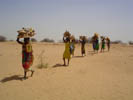
Addressing the U.N. Security Council this week, the head of the joint U.N.-African Union (UNAMID) mission to Darfur, Rudolphe Adada, called the situation a “ low intensity conflict.” based on “purely numerical terms ” (i.e.: total violent deaths per month).
News agencies jumped on this statement, portraying Adada’s comments as an overall assessment of the “situation in Sudan’s western Darfur region, which Washington has described as genocide,” as Reuters put it.
Adada’s comments do not take into account crucial dynamics of the crisis in Darfur. It may be true that attacks by government-sponsored militia have decreased in the areas where UNAMID is deployed, and as a result, fewer violent deaths regularly occur. However, violent death account for only a fraction of the total mounting death count in Darfur today. Furthermore, given that, in Adada’s own words, his forces in the beleaguered region are working "at about one third of projected full capacity," it is probable that UNAMID does not actually have a clear picture of the overall situation on the ground.
According to Enough’s, the story on the ground is different than that which Adada’s is reporting, especially in areas not covered by UNAMID forces. Darfur is still plagued by government of Sudan soldiers and its Janjaweed militias that roam the countryside with utter impunity, the bandits that terrorize local communities, and the occupiers of the lands vacated by forced displacement.
Intense insecurity remains throughout Darfur. Adada should have chosen his words more carefully and considered the broader picture before making irresponsible comments that give the impression that the crisis is abating.
An estimated 1 million people are at risk of disease and starvation because the aid they depend on was cut off by the Sudanese government. The close quarters of the camps, where human waste is no longer being removed, will become breeding grounds for cholera and water-borne diseases as soon as the June rainy season arrives. The people of Sudan talk about record heat blanketing the region, which could lead to cases of meningitis and which make the water shortage in many of the camps even more dire. Moreover, the weather forecasters in Khartoum say there may be an early start to the rains this year, which means there could be even less time for the remaining NGO’s or the replacement ones – if they ever arrive – to prepare for the disasters expected with the coming rainy season.
Darfur today is the furthest thing from a “low intensity conflict,” and someone holding a position of influence like Adada’s would do well to think about the people he’s meant to protect when he’s given an audience with the U.N. Security Council.
Laura Heaton contributed to this post.

